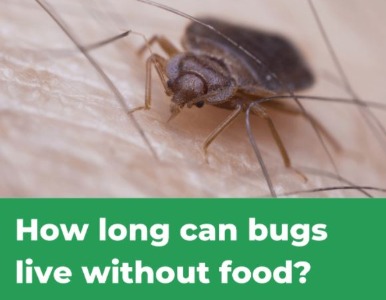Bed bugs can live 20 days to 6 months without food, but their feeding needs are influenced by humidity temperature. The stage of development of the bed bug also determines how long it will survive without a blood meal. Older stages of nymphs tend to survive longer without food than newly hatched bed bugs.
Some experiments have found that adult bed bugs can go up to 12 months without food under low-temperature conditions.
During that period when they do not have a blood meal, they will not reproduce or lay eggs.
Assuming it’s an empty house, how long will bed bugs remain alive?
If bed bugs have no host available entirely for them to draw blood from, the situation can get quite difficult. A young bed bug will only last about 4 weeks without a blood meal. When newly hatched bed bugs cannot get the first meal to enable it to grow to the next stage, they will die much faster.

On the contrary, an adult can survive without food for approximately 6 months as long as the other conditions remain optimal.
Based on these items, you can see that starvation is not one of the fastest ways to kill bed bugs.
If you want to kill them faster, other better alternatives could speed up elimination.
How long can Baby Bed Bugs Live Without Food?
Baby bed bugs can live without food for 7 to 60 days. If the newly hatched baby bed bug has not had its first blood meal, it may survive for only a few days. In the absence of food, they will dry up and die before growing past the nymph stage.
Although we have seen that how long bed bugs can survive without food varies. Many factors can come into play.
One of these factors is usually the age of the bed bug.
The body of a young bed bug is not as developed as the adult ones. Therefore, it will not sustain hunger for too long.
Bed Bugs Conserving Energy and Survive Longer Without Food in Cold Environments
If you suspect that your house has an infestation of too many baby bed bugs, starving them could be one strategy to consider.
When in a smaller room, bed bugs will have a much smaller room to crawl looking for food. They will survive for fewer days in a larger house without a source of blood meal because pests would be forced to cover more ground searching for a host.

Another factor to consider is the humidity and temperature of the room.
Bed bugs survive longer when the environment is cold. Lower temperatures allow the insects to use less energy.
It is pretty much the same as other animals.
Animals can survive for more days in cold environments compared to hot deserts. For bed bugs, it is not that hot environments dehydrate them. Actually, bed bugs do not drink water. Instead, warm environments make their survival difficult because heat forces them to move a lot thus being incapable of conserving energy.
As you can see, the answer to the question depends on a ton of factors.
In some places, bed bugs can survive for even 12 months without food. By understanding these behaviors and eating habits, you can find the best prevention and solution plan for bed bug infestation.
RELATED: Why Are Bed Bugs Only Biting Me?
RELATED: What Attracts Bed Bugs?
Adult Bed Bugs without Food
Having understood that nymphs can survive several weeks without feeding, how long can adult bed bugs live without blood after maturity?
Mature bed bugs can live up to 12 months in the right conditions. Adult ones may need to feed regularly but that does not mean they will die faster without a blood meal. In an empty house, they will only live for about 6 months without food.
To move to the next stage of development, bed bugs need to eat at least once every week.
Without a blood meal, most bed bugs will not grow into the next stage.
Although they will survive and remain alive for long, their growth cycle will stagnate if no host is available.
Bed bugs can live in a mattress for 6 months if kept inside the house assuming there are no hosts. Outside the house, the environment would be a bit harsh and the insects would only last 3 to 7 days in a mattress that’s directly heated by the sun.
Inside the house, bed bugs also tend to spend less energy looking for hosts that are humans sleeping on the mattress. That suggests they could live longer if they can get a blood meal every 3-6 days.

